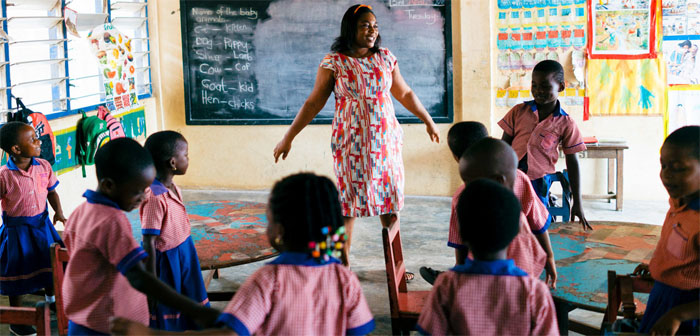Ghana is a leader in pre-primary education in sub-Saharan Africa.
In 2008, the country included two years of pre-primary education (Kindergarten) as part of its constitutional commitment to Free and Compulsory Universal Basic Education (FCUBE).
Yet, more than 400,000 children, approximately 1 in 4 pre-primary age children are still not enrolled in kindergarten, according to the, ‘A World Ready to Learn: Prioritizing quality early childhood education,’ UNICEF’s first ever global report on pre-primary education.
According to the Ghana Multiple Indicator Cluster Survey 2017/18, majority of these children belong to the poorest families and are most likely to be living in the northern regions of Ghana.
“Pre-primary schooling is our children’s educational foundation – every stage of education that follows relies on its success,” said the UNICEF Representative in Ghana, Anne-Claire Dufay. “All children should be given this opportunity, so they can learn, grow and develop to their full potential.”
The report reveals that children enrolled in at least one year of pre-primary education are more likely to develop the critical skills they need to succeed in school, less likely to repeat grades or drop out of school, and therefore more able to contribute to peaceful and prosperous societies and economies when they reach adulthood.
Globally, the report notes that household wealth, mothers’ education level and geographical location are among the key determinants for pre-primary attendance.
However, it cited poverty as the single largest determining factor.
In 2017, an average of 6.6 per cent of domestic education budgets globally were dedicated to pre-primary education, with nearly 40 per cent of countries with data allocating less than 2 per cent of their education budgets to this sub-sector.
In Ghana, less than 6 per cent is allocated to pre-primary education.
This places Ghana at par with the global average and is higher than the regional average of 2.5 per cent among the countries in Western and Central Africa.
The pupil teacher ratio in pre-primary in Ghana is 39 to 1, and 75 per cent of teachers are trained.
These numbers have progressively improved due to targeted investments.
The global report highlights the success of the Untrained Teacher Diploma in Basic Education (UTDBE), an innovative programme launched by the Ministry of Education in 2012.
Nearly 8,000 young teachers from disadvantaged districts were trained through distance learning, over a four-year period, to close the trained teacher resource gap in basic schools.
UNICEF thus commended the Government of Ghana for its leadership and progress in pre-primary education.
It however noted that building on these successes, it is important to prioritize and adequately resource quality pre-primary education.
“When Governments invest in early education, they ensure that their workforce is competitive in tomorrow’s economy,” said Anne-Claire Dufay. “This is particularly beneficial for the most vulnerable children and contributes to the Agenda 2030 to leave no child behind. Let’s give all children the best start in life.”
By Jamila Akweley Okertchiri


